Ultimate Guide to the Top 4 Tools to Reduce Audio File Size
Audio files are essential for a variety of purposes, including podcasts, music, audiobooks, and business presentations. However, large audio files can cause storage problems and slow down upload times, especially when sharing content online. Whether you're a content creator, musician, or someone needing to manage your media library, reducing audio file size can make things easier. However, choosing the right audio file size reducer is important to preserve audio quality. In this guide, you will explore the four methods on how to reduce audio file size and choose the best option for your needs.
Part 1: Why Do You Need to Reduce Audio File Size?
Before diving into the tools that can help with audio compression, it's important to understand why reducing file size matters. Here are some benefits of reducing audio file size:
- Saving Storage: A musician managing hundreds of demo tracks or a journalist archiving interviews can free up valuable space by compressing audio files without losing essential quality.
- Faster Uploads and Downloads: Podcasters uploading weekly episodes benefit from quicker uploads, especially when working with platforms with file size limits or slower internet speeds.
- High Compatibility: Smaller files are more likely to be compatible with mobile devices, older media players, or streaming platforms, ensuring smooth playback across systems.
- Improved Streaming Quality: By reducing the file size, you can stream audio content more smoothly, especially with limited bandwidth.
- Better Organization: Those with large music libraries can organize and store more content on portable devices by reducing file sizes, making playback seamless without sacrificing quantity.
Part 2: Top 4 Tools to Compress Audio
Whether you are wondering how to reduce audio file size of MP3 or other formats for a podcast episode or your music library, here are the four file size reducers to consider:
1. HitPaw Univd
HitPaw Univd (HitPaw Video Converter) is a versatile software with excellent video and audio conversion capabilities. With an intuitive interface, it can convert and reduce the size of audio files in a few simple steps. It supports multiple formats and advanced codecs, making it a great choice for users with various needs. You can enjoy lossless audio conversion while shrinking file size. It also lets you compress multiple audio files in batches to save time and effort. You can even play the media files if required.
Main Features:
- Come up with an intuitive workflow to reduce size of audio files
- Help you compress audio in any format, like MP3, WAV, M4A, WMA, M4B, etc.
- Enable you to compress audio by extracting it from video sources
- Reduce audio file size by changing the encoder, bitrate, and other parameters
- Allow you to edit, merge, and crop files with its smart editing tools
How to Reduce the Size of MP3 Audio Files using HitPaw Univd:
Step 1. Import AudioFirst of all, launch this software and go to its "Converter" section. Then, click "Add Files"> "Add Audio" to upload the required audio file.
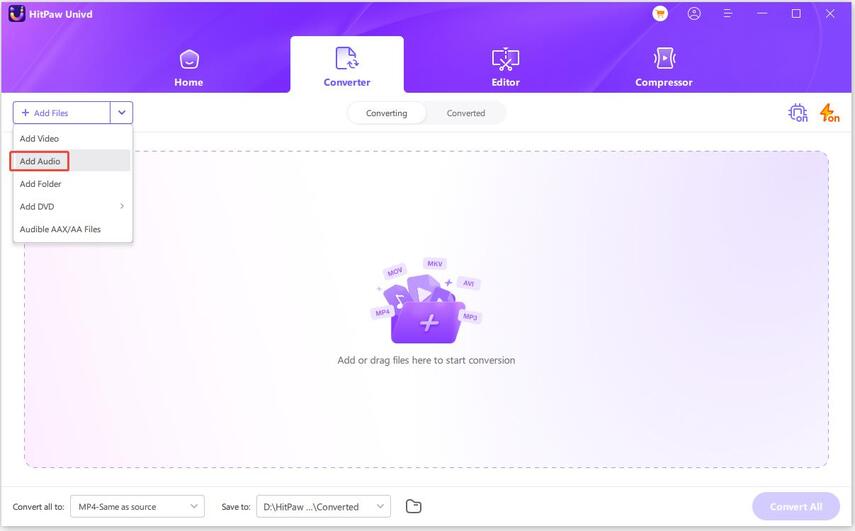
Step 2. Choose Output Format
Next, expand the "Convert all to" drop-down menu and select the desired format under the "Audio" category.
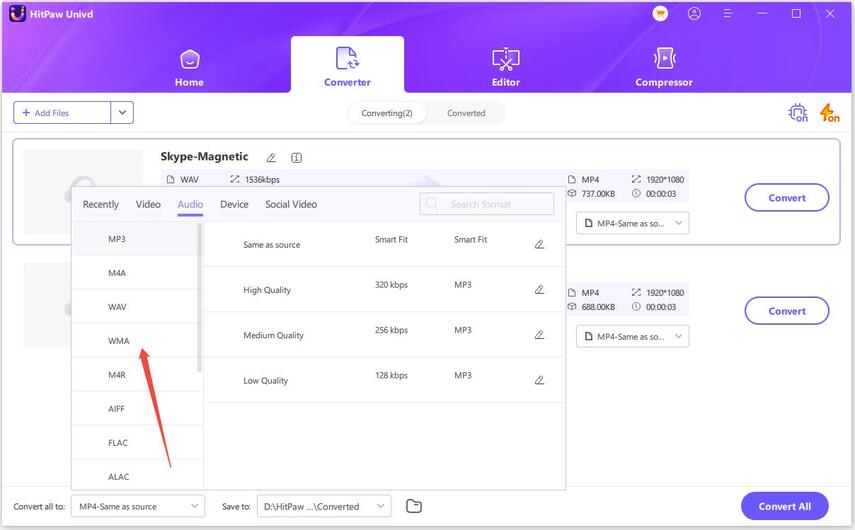
Step 3. Adjust Preferences
It's time to press the pen icon for the desired format, choose the bitrate, encoder, channel, and sample rate, and press "Create."
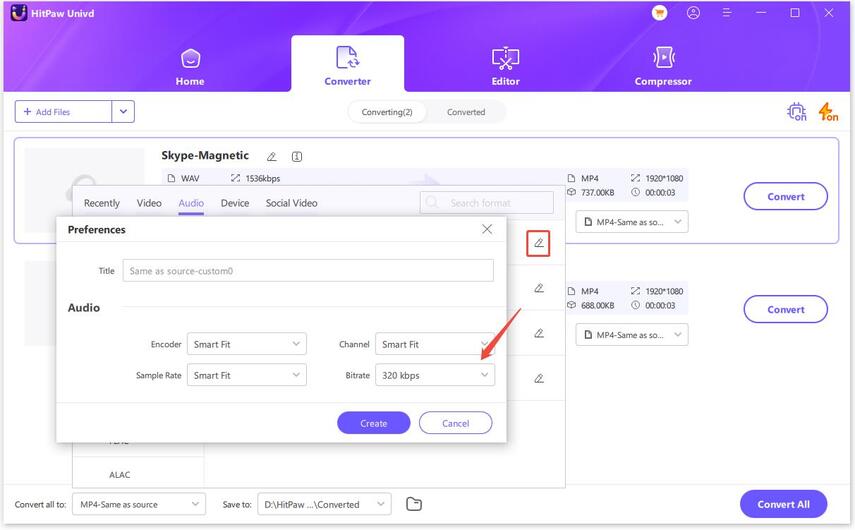
Step 4. Convert Audio
Pick the destination folder and hit "Convert" or "Convert All" to start the conversion. You can access the output from the "Converted" section. That's it!
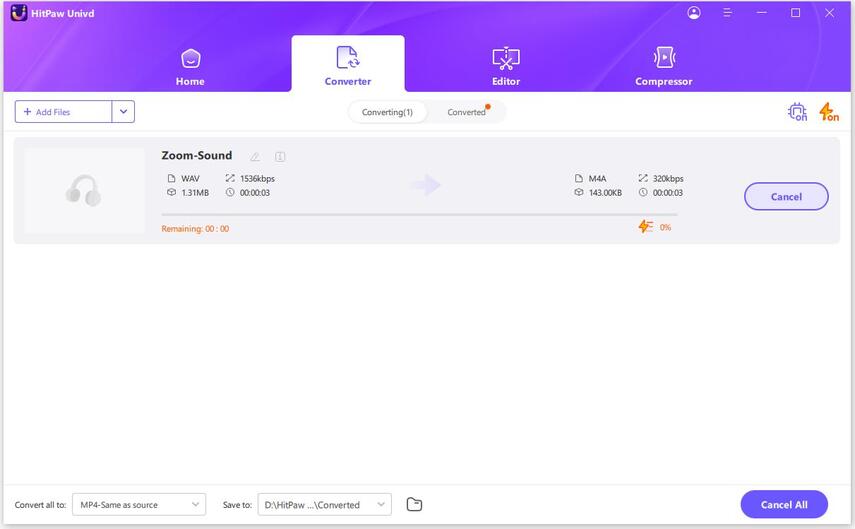
2. VLC
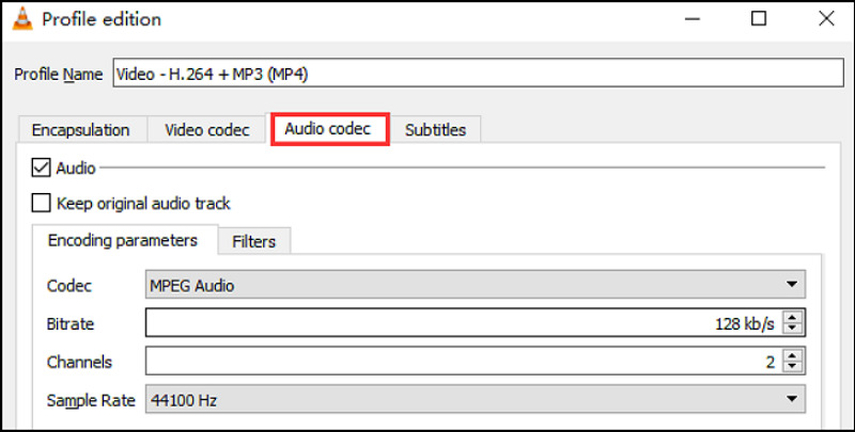
VLC Media Player is a free, popular, open-source player offering basic audio compression features. While its primary focus is playback, you can use its conversion function to reduce audio file size by changing parameters. However, you should sacrifice video quality.
Advantages:- Lightweight and efficient
- Support a wide range of audio formats
- Offer audio stream download options
- Lack of advanced compression options
- The user interface is complex for beginners
3. Freemake Audio Converter
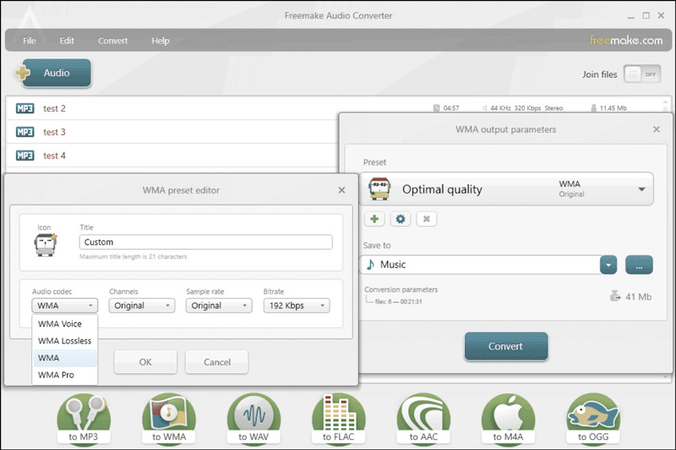
Freemake Audio Converter is another famous software with effective audio compression features. It supports 50+ audio formats and can quickly reduce the size of MP3 and other files by adjusting codecs, channels, sample rate, and frame rate. You can even extract audio from videos.
Advantages:- Convert between audio and video formats
- Batch conversion support
- Allow joining audio files
- The free version is limited to audio files of less than 3 minutes
- Compression options are fewer compared to specialized tools
4. Audacity
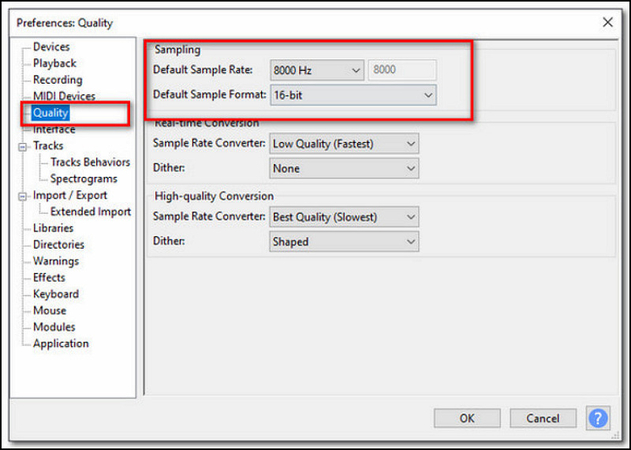
Audacity is free, cross-platform audio editing and recording software that can compress audio files. It is an excellent choice for those who need more control over the compression process, especially for editing and mastering audio tracks. It can also optimize audio files up to 320kbps.
Advantages:- Offer powerful editing functionalities
- Support multiple audio formats
- Allow compressing recorded audio files
- Require some technical knowledge for optimal results
- The user interface is not intuitive for beginners
Part 3: Top Four Audio Formats for Compression
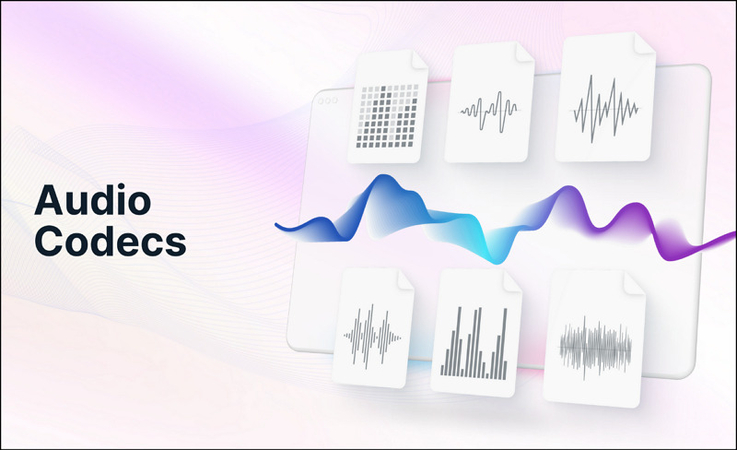
When reducing audio file size, choosing the right format can make a huge difference. Here is a comparison of the most common audio formats used for compression:
MP3 is the most widely used audio compression format. It offers a good balance between audio size and quality, making it ideal for music files and podcasts.
AAC (Advanced Audio Codec) is similar to MP3 but offers better sound quality at lower bit rates. It is commonly used for streaming and is the preferred format for many platforms, including YouTube and iTunes.
Opus is a relatively newer format designed for efficient streaming and low-latency communication. It is an excellent choice for voice recordings, offering great compression without significant quality loss.
OGG is an open-source audio file format that offers good compression and is often used for streaming. It is similar to MP3 but with slightly better sound quality at lower bit rates.
But which one is the best?
- MP3 remains a safe choice for general use and compatibility, but if you need better quality at a smaller size, AAC is often the better option.
- Opus is ideal for high-quality compression at low bitrates (such as for podcasts or VoIP applications), though it's not as widely supported yet.
- OGG is great for streaming and open-source projects. It is best for those who prioritize efficiency and are willing to sacrifice some device compatibility.
To conclude, AAC is often the best choice for audio compression due to its balance of quality and file size. Opus is a close runner-up for specific applications like live communication or real-time audio.
Part 4: FAQs about Reducing Audio File Size
Q1. How to reduce audio file size using VLC?
A1.
To reduce audio file size using VLC:
Q2. What is the best way to reduce audio file size?
A2. The best way to reduce audio file size depends on the format and the tools you choose. HitPaw Univd is a great choice due to its intuitive interface, batch conversion, and flexible compression settings.
Conclusion
Reducing audio file size can significantly improve storage, upload speed, and compatibility across platforms. The above formats and tools discussed in this post will help you achieve the balance between size and quality. However, HitPaw Univd is the most effective solution. This audio file size reducer offers fast conversions, a user-friendly interface, and various customizable settings. Try this software today and reduce your audio file size with ease!








 HitPaw Edimakor
HitPaw Edimakor HitPaw VikPea (Video Enhancer)
HitPaw VikPea (Video Enhancer)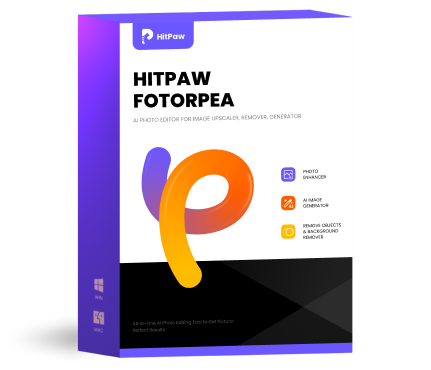 HitPaw FotorPea
HitPaw FotorPea

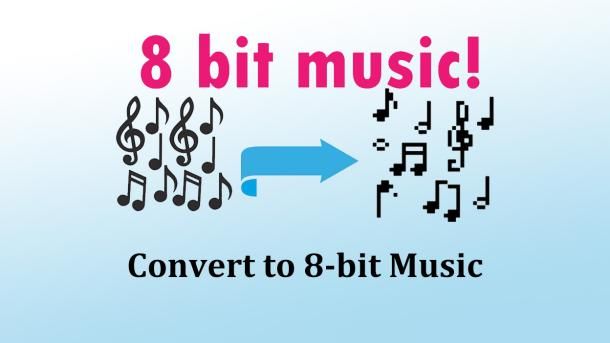

Share this article:
Select the product rating:
Daniel Walker
Editor-in-Chief
This post was written by Editor Daniel Walker whose passion lies in bridging the gap between cutting-edge technology and everyday creativity. The content he created inspires the audience to embrace digital tools confidently.
View all ArticlesLeave a Comment
Create your review for HitPaw articles